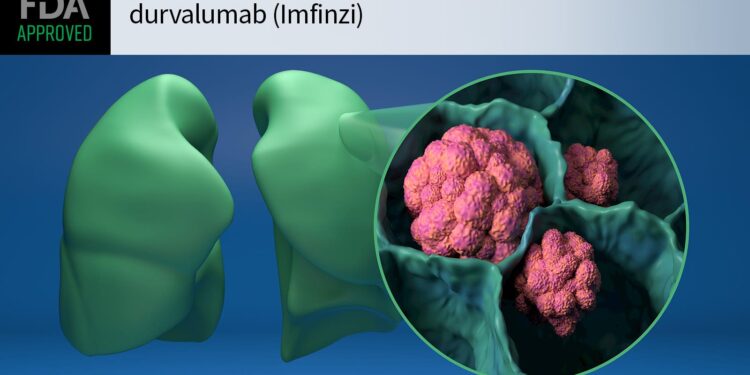The FDA expanded the indications for the immune checkpoint inhibitor durvalumab (Imfinzi) to include limited-stage small cell lung cancer (SCLC).
Approval stipulates use of the PD-L1 inhibitor in limited-stage SCLC that has not progressed following platinum-based concurrent chemoradiation.
Support for the approval came from the phase III ADRIATIC trial of 730 patients with stage I-III SCLC, all of whom had non-progressive disease following standard-of-care platinum-based chemoradiation. Patients were randomized to placebo or to durvalumab with or without the CTLA-4 inhibitor tremelimumab (Imjudo). The tremelimumab results remain blinded, leaving 536 patients for the analysis of durvalumab versus placebo.
The results showed an unprecedented improvement in median overall survival of almost 2 years, from 33.4 months with placebo to 55.9 months with durvalumab (HR 0.73, 95% CI 0.57-0.93). Median progression-free survival improved from 9.2 months with placebo to 16.6 months with the anti-PD-L1 monoclonal antibody (HR 0.76, 95% CI 0.61-0.95).
“Consolidation durvalumab will become the new standard of care for patients with limited-stage small cell lung cancer following chemoradiotherapy,” said David Spigel, MD, of Sarah Cannon Research Institute in Nashville, Tennessee, during a presentation at the American Society of Clinical Oncology (ASCO) meeting earlier this year.
ASCO-invited discussant Lauren Byers, MD, of the University of Texas MD Anderson Cancer Center in Houston, said ADRIATIC is a “landmark study and provides a new standard of care for patients with early-stage small cell lung cancer.”
Grade 3/4 adverse events occurred in 24% of patients treated with durvalumab or placebo. The most common all-grade AEs (≥20% of patients) were pneumonitis/radiation pneumonitis, which reached grade 3/4 severity in 3.1% of durvalumab-treated patients and 2.6% of the placebo group.
Source link : https://www.medpagetoday.com/hematologyoncology/lungcancer/113225
Author :
Publish date : 2024-12-05 14:15:50
Copyright for syndicated content belongs to the linked Source.


![author['full_name']](https://newshealth.biz/wp-content/uploads/2024/12/Durvalumab-Wins-FDA-Approval-in-Limited-Stage-SCLC.jpg)












